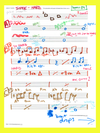Musicians Deserve Healthcare—Just Like Everyone Else
Chappell Roan’s Grammy acceptance speech applies to me and you, too.

I did not have health insurance between January 2020 and June 2024, save for a couple of months here and there when I managed to come up with the roughly $500 necessary to get the cheapest coverage available to me in New York. I never went to the doctor. There was a global pandemic in full swing, and I, like many other Americans, was just hoping I didn’t get seriously ill.
I was also a working independent musician during this period, and still am. In summer 2020, while much of the world was still isolating, my band masked up and went into the studio to finish an album we’d started just before the pandemic. Our audience isn’t huge, but it is devoted. When we got back on the road in 2021, we would sometimes hear from fans about how our music had helped them through the lockdown months. That made me feel like the risks were worthwhile, that we weren’t just indulging our own desire to play together again, though of course we were doing that too.
My economic situation was typical of my cohort of millennials who grew up relatively privileged, entered creative industries as adults, then watched those industries wither in the grip of growth-obsessed private equity firms and union-busting CEOs, just as our careers were supposed to get going. I was not poor, but I was almost always broke. Music has never been my only or even my primary source of income—far from it. This is also typical of my generation of indie musicians, at a time when breaking even on an album or tour might be considered a great success. In those pandemic years, I was also working as a freelance writer and editor, and, once bars and restaurants in my town began offering limited service as restrictions eased, a bartender and server.
It didn’t really occur to me to think of myself as an uninsured musician, any more than I thought of myself as an uninsured bartender or an uninsured editor. I was just an uninsured person, or, if I wanted to get a bit more economically specific about it, an uninsured gig worker, just like millions of Americans. In my view, then and now, the best solution to my uninsured status was obvious: a single-payer healthcare system, like the one advocated for by Bernie Sanders in his presidential campaigns, like the one they have in Canada. That way, I would just be covered, regardless of my employment status in music or any other field. So would any musicians with more precarious situations than mine, and so would all of our neighbors.
I bring all this up in response to Chappell Roan’s recent speech at the Grammys, in which the Best New Artist winner advocated for record labels to offer “a livable wage and healthcare, especially to developing artists” on their roster. It’s hard to argue with a major star, who can now certainly afford her own coverage, using a platform in front of the entire music industry to call for better treatment of musicians lower on the ladder than her. But the specifics of Roan’s speech are a little shaky. For one thing, as a Rolling Stone piece following the speech pointed out, major-label artists like Roan already do have access to a pretty sweet insurance deal, not directly through the labels themselves but through SAG-AFTRA. The media-industry union has agreements with all three majors to provide insurance for their artists, with premiums at around just $125 a month.
Roan’s speech prompted a minor flurry of news coverage and social media commentary about healthcare for musicians, a topic that has often gone overlooked even as listeners and publications have grown more attuned to the economic difficulties their favorite artists often face. For that alone, we should be grateful to her for speaking up. And in the wake of a condescending Hollywood Reporter op-ed by former music exec Jeff Rabhan, filled with more cliches and mixed metaphors than I’ve ever encountered in a single piece of writing, Roan pledged to donate $25,000 to “struggling dropped artists”—surely putting to rest Rabhan’s claim that she had no “skin in the game” to earn “a seat at the table” or “willingness to leave blood on the floor and to put your money where your mouth is.” (Just that single paragraph in Rabhan’s piece also contains references to “life and limb,” “harm’s way,” and “where the rubber meets the road.”)
But the singer’s proposed solution—that labels treat artists as employees, with salaries and health benefits—would leave many of the least financially secure musicians in the cold. I think it’s reasonable to presume that, were such a plan to ever actually be implemented, it would apply only to the major labels and perhaps the largest indies, who are well positioned to negotiate with insurers, with enough capital and logistical capability to actually pull the plan off. I have worked with a few different indie labels in my life, ranging from no-budget passion projects to a label whose artists sometimes do millions of Spotify streams, but which is still essentially run by one person. I am confident that none of them are in a financial position to insure their artists. Not to mention the countless musicians who have devoted their working lives to the art—teaching, or playing in jazz clubs, on cruise ships, at bars or casinos, in weddings or religious services, wherever live music happens—but have no label affiliation at all.
This week, the family of David Johansen—singer of proto-punk greats the New York Dolls and a left-field one-hit-wonder as Buster Poindexter—announced that they are seeking donations from fans to fund treatment for Johansen’s stage-four cancer and broken back. These stories of musical legends who must rely on public goodwill to help them weather medical crises are sadly common. (I remember learning, in 2019, that Janet Weiss, drummer of Sleater-Kinney and many other bands, had turned to GoFundMe after a serious car accident, and briefly questioning my entire life path.) Johansen, who last released music on a major label in 2009, would presumably not benefit under a system that leaves insurance in the hands of labels. But if we had universal healthcare in this country, he wouldn’t need to run a fundraiser.
Later in the speech, Roan talked about having been dropped by Atlantic Records in 2020, before her current career surge, and being unable to find a job or afford insurance during the pandemic. “It was so devastating to feel so committed to my art and so betrayed by the system and so dehumanized to not have healthcare,” she said. I can relate. But also—in a system that treats artists as employees of the labels that sign them, wouldn’t she still have lost her insurance (or had to pay for COBRA) when she was dropped, just like everyone else who gets fired? On the other hand, in a country that treats access to healthcare as a fundamental right rather than a luxury for those who can afford it, her coverage would not have been impacted at all.
There are many economic issues that impact musicians specifically. But on the question of healthcare, we are in the same boat as the more than 50 million other Americans who do gig work of any kind. It may seem quixotic to be arguing for a massive extension of federal government benefits to all Americans at a time when the second Trump administration seems determined to bleed the entire welfare state dry, but it’s important to fight back against oppression with our own goals for how society might look in mind, no matter how far off they may seem.
Perhaps Roan’s speech would have made less of an impact if she had talked about healthcare for everyone, rather than the plight of musicians in particular. The next time a star steps on an awards stage hoping to help the rest of us out, maybe they’ll mention the Living Wage for Musicians Act, a bill introduced into Congress last year that would establish a new government-paid royalty that would guarantee at least one cent per stream to artists whose work is played on platforms like Spotify. One cent! Our country may be getting crueler, but I still don’t think that’s too much to ask.





